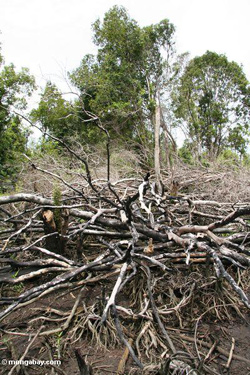SHOW YOUR SUPPORT: ShareThis | submit Indonesia may allow conversion of peatlands for palm oil
5:46 PM Diposkan oleh arfa
The Indonesian government will allow developers to convert millions of hectares of land for oil palm plantations, reports The Jakarta Post. The decision threatens to undermine Indonesia's efforts to reduce greenhouse gas emissions from land use and fashion itself as a leader on the environment among tropical countries.
Gatot Irianto, head of research and development for the Agriculture Ministry, said the department is drafting a decree that would allow the drainage and conversion of peatland areas into oil palm estates.
“We still need land for oil palm plantations. We must be honest: the sector has been the main driver for the people’s economy,” he told The Jakarta Post on the sidelines of a meeting organized by the National Commission on Climate Change.
“We’ve discussed the draft with stakeholders, including hard-line activists, to convince them that converting peatland is safe,” he said. “We promise to promote eco-friendly management to ward off complaints from overseas buyers and international communities.”
 Peatlands, formed by organic deposits comprised of partially decayed plant matter that accumulates over time, cover more than 400 million hectares of land worldwide. Most of these exist in permafrost in the far north, though some are found in the lowlands of tropical Asia, especially in the swampy forests of Indonesia and Malaysia. Peatlands, which form over hundreds of years and sometimes more than 66 feet (20 meters) deep, are giant reservoirs of carbon, storing around 2,000,000 million tons of carbon dioxide globally. However, when peatlands are drained, cut, or burned this stored carbon is released into the atmosphere, contributing to climate change. Photo by Rhett Butler. |
Degradation and destruction of peatlands in Indonesia results in hundreds of millions of tons of greenhouse gas emissions each year. Generally, developers dig a canal to drain the land, extract valuable timber, then clear the vegetation using fire. In dry years these fires can burn for months, contributing to the "haze" that plagues southeast Asian with increasing frequency. Fires in peatlands are especially persistent, since they can continue to smolder underground for years even after surface fires on extinguished by monsoon rains.
While burning releases enormous amounts of carbon dioxide, merely draining peatlands also contributes to global warming — upon exposure to air, peat rapidly oxidizes, decomposes, and releases carbon dioxide. A study led by Dr. Susan Page University of Leicester found that producing one ton of palm oil on peatland generates 15 to 70 tons of CO2 over 25 years as a result of forest conversion, peat decomposition and emission from fires associated with land clearance.
Indonesia is home to some 20 million hectares of peatlands, which store billions of tons of carbon. Clearance, drainage and fires in peatlands worldwide accounts for more than 3 billion tons of carbon dioxide emissions every year, or about 10 percent of global emissions, according to Wetlands International, an environmental group.
Given the emissions associated with conversion of peatlands, some environmentalists are pushing for oil palm expansion on degraded and abandoned agricultural lands. Indonesia has tens of millions of hectares of such lands that would be suitable for oil palm cultivation, but industry has been slow to move because plantation owners usually rely on logging to subsidize the up-front cost of planting.
Indonesian political leaders have lately acknowledged the significance of peatlands to climate stability. Several governors have decreed temporary bans on peatland forest conversion, while President Susilo Bambang Yudhoyono is said to be preparing measures to more sustainably manage peatlands after declaring a country-wide ban on peatland development in December 2007. In is unclear how the Agriculture Ministry's proposal will affect these plans.
Environmental groups expressed concern over the announcement.
"We think it is a crazy proposal," Martin Baker, communications manager at Greenpeace International in Asia, told Reuters.
"The government needs to protect the remaining peatlands and forests if we are to slow down climate change and protect the livelihoods of forest-dependent communities and biodiversity," Greenpeace forest campaigner Yuyun Indradi told The Jakarta Post.

















































